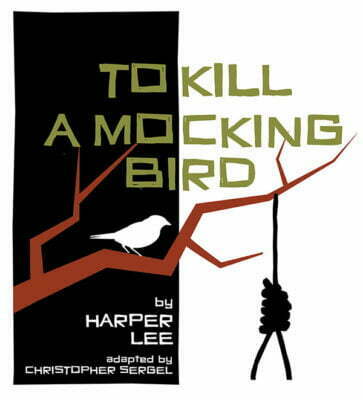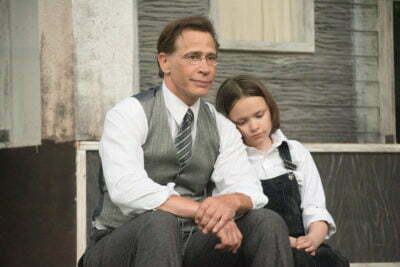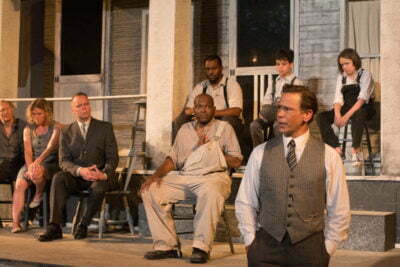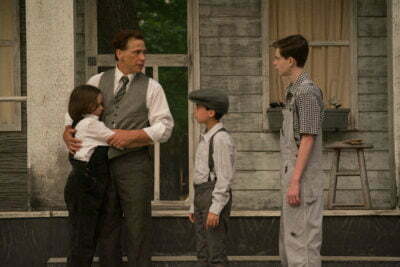To Kill a Mockingbird
Adapted by Christopher Sergel
From the Novel by Harper Lee
Directed by Vaun Monroe
Produced by Oak Park Festival Theatre
Struggle for Justice Even Greater Under the Sky
News that Harper Lee is publishing a sequel to her 1960 novel To Kill a Mockingbird should stoke even greater interest in the perennially popular stage adaptation. Now in an outdoor production by the Oak Park Festival Theatre, Lee’s story of courage in the face of overwhelming cruelty and bigotry remains as relevant as ever, as does the lesson Scout and Jem learn about the persistence of evil. Outdoor theatre always carries some risks, and we are now at the end of an unusually cold, damp spring, but if you pick the right day to visit Austin Gardens, you will find an amazing production that utilizes the nighttime atmosphere in innovative, and often unnerving ways.

The story is narrated by the adult Jean-Louise (Roxanne Saylor), who recalls how, as a child, her brother Jem’s arm was broken. We see Jean-Louise as a child called Scout (Ada Grey), with Jem (Kyle Klein II), their friend Dill (Aaron Lamm), and their father the lawyer, Atticus (John Mossman). About the first fifteen minutes of the play are brief scenes of the townspeople in the fictional Maycomb, Alabama, who seem to mostly be interfering and judgmental, but Atticus demands that his children not condemn them too harshly. His children worry that he might be shamefully old and feeble compared to his neighbors. After several incidents in which they unsuccessfully attempt to provoke him, or confront people who disrespected him, the children slowly learn that Atticus has taken on the futile and socially stigmatizing responsibility of advocating for Tom Robinson (Robert Hardaway), a black man accused of raping a white woman, and gain a great deal of respect for him.
The night I attended, rolling thunder provided a natural soundtrack which emphasized the gravity of the story’s moral lessons. But director Vaun Monroe has plenty of other ways of utilizing the natural darkness and open spaces around Margaret Goddard-Knop’s simple grey set. The sudden appearance of Klansman, and the knowledge that somewhere in those shadows is a blade-wielding madman heighten the tension of this production far above the usual Mockingbird, where the theatre or classroom always feels safe, and we are, like the adult Jean-Louise, looking back on past events. The feeling of wind on the back if your neck isn’t as pleasant when you’re sitting with Atticus, waiting for the lynch mob. Somebody did their best with the sound design, which is always a problem with outdoor theatre, and I count myself lucky to have sat in the first row. But with such great visuals, an immersive up-close experience is preferable anyway.
 I hurt for the children as they watched the proceedings in the court room. Grey, Klein, and Lamm perfectly conveyed their characters’ hopes and disappointments, as well as their boisterous sense of wonder at the town’s foibles in earlier scenes. Robert Hardaway’s Tom is so realistic you can almost smell his fear, as is the case with Joshua Carroll’s Boo Radley. Aaron Christensen is pure nastiness as Bob Ewell in a way that could be hammy in a less serious story, but Alex Fisher gives such a creepy, unsettling performance as his daughter Mayella that their incest can hardly even be called subtext. Of course, it’s Atticus everyone wants to see, and John Mossman is the courageous, principled, but weirdly naïve in some ways voice for justice so beloved by generations of high schoolers. His dedication to seeing the good in everyone is sincere, and yet, watching Mossman’s performance, it seemed that maybe Atticus’s failure to take Bob Ewell’s threats seriously was just a little bit due to arrogance as well.
I hurt for the children as they watched the proceedings in the court room. Grey, Klein, and Lamm perfectly conveyed their characters’ hopes and disappointments, as well as their boisterous sense of wonder at the town’s foibles in earlier scenes. Robert Hardaway’s Tom is so realistic you can almost smell his fear, as is the case with Joshua Carroll’s Boo Radley. Aaron Christensen is pure nastiness as Bob Ewell in a way that could be hammy in a less serious story, but Alex Fisher gives such a creepy, unsettling performance as his daughter Mayella that their incest can hardly even be called subtext. Of course, it’s Atticus everyone wants to see, and John Mossman is the courageous, principled, but weirdly naïve in some ways voice for justice so beloved by generations of high schoolers. His dedication to seeing the good in everyone is sincere, and yet, watching Mossman’s performance, it seemed that maybe Atticus’s failure to take Bob Ewell’s threats seriously was just a little bit due to arrogance as well.

Maude Atkinson (Belinda Bremner) has a speech in which she tries to spin the jurors’ deliberation as a victory, noting that debate would continue and at least one person’s racist stance must have softened, and more peoples’ surely will in the future. How inadequate that feels. I’m not sure if Sergel’s adaptation really provides enough justification for Atticus’s statement that most people are nice when you get to know them. The nosy, hollering neighbors aren’t quite as bad as the malevolent choruses Tennessee Williams often included in his plays, but “nice” isn’t the word for a lot of these characters, and we don’t see anything that balances out that most of the people in Maycomb are apparently willing to execute someone they know is innocent. (Really, what possibly could?) Oak Park Festival’s production only has a few actors in non-speaking parts, though, which keeps the focus tight on the Finch family and a few other individuals. Regardless of what Maycomb people are really like, Scout’s discovering of her father’s heroism is a powerful and much-beloved story, and Oak Park Festival’s telling is sure to satisfy both those who are hearing it for the first time, and those who know it well.
Highly Recommended
Jacob Davis
[email protected]
Reviewed June 19, 2015
This show has been Jeff recommended.
For more information, see To Kill a Mockingbird’s page on Theatre in Chicago.
Playing in Austin Gardens, 167 Forest Avenue, Oak Park, Il. Tickets are $27, with discounts for students and seniors, and free for children under 12. To order, call 708-445-4440 or visit oakparkfestival.com. Plays Thursdays-Saturdays at 8:00 pm and Sundays at 7:00 pm through July 18. No performance July 4, extra performances July 1 and 15 at 8:00 pm. Running time is two hours and twenty minutes with one intermission.
